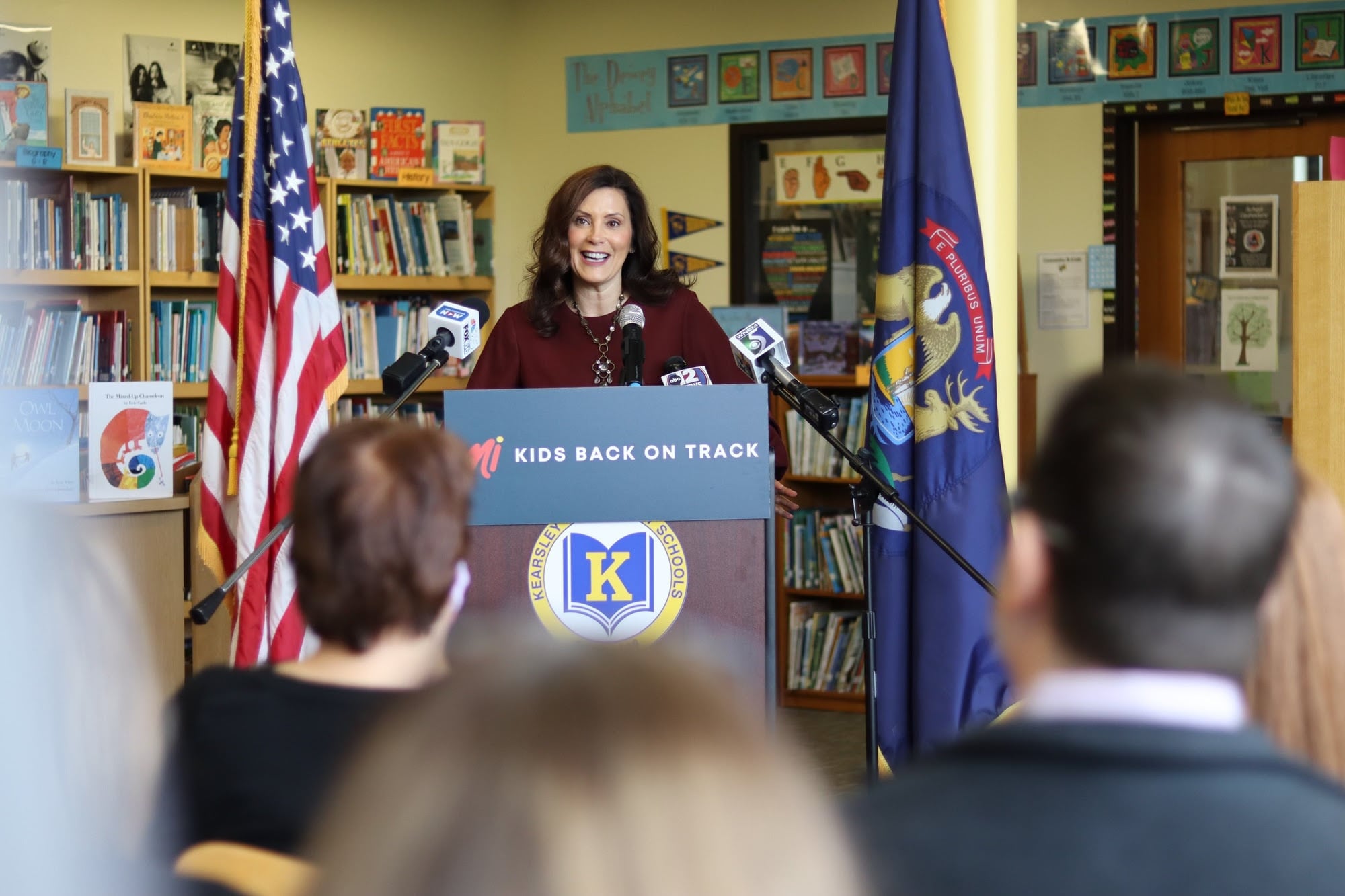Michigan lawmakers agreed to hundreds of millions of dollars in new special education funding as part of a new state budget in which they tapped a historic surplus to pass one of the most sweeping school spending plans in decades.
Teacher recruitment, school security, mental health and the teacher pension system will also get significant new support under the budget, which was approved early Friday morning after a marathon session that began Thursday.
The $19 billion school aid budget is a 12% increase over last year’s budget, though smaller than the $21.7 billion budget passed in the first year of the pandemic.
The budget includes a $450-per-pupil funding increase, or 5%. That’s more than the $435 increase Whitmer proposed in February, a reflection of a fiscal situation in Michigan that has steadily improved in recent months thanks to a post-pandemic consumer spending boom and an influx of federal COVID relief funds. The increase will cost the state $630 million and bring the basic school funding formula to $9,150 per pupil for most districts.
To reach the deal, Whitmer and Republican leaders set aside debates over tax breaks, which both sides support in some form. They left billions on the table that could be spent in later supplemental budgets or used for tax breaks.
Here are some of the major education issues affected by the budget:
Special education funding
The state will spend roughly an additional $312 million on students with special needs to address long-running concerns among educators that the state was failing to recognize the true cost of providing special education services. These concerns gained urgency amid the shift to online schooling during the pandemic, when many students with disabilities struggled to access education.
“The response I got from superintendents was a lot of ‘wows,’” said Bob McCann, executive director of the K-12 Alliance, an advocacy group that pushes for expanded school funding. “It’s going to be a game changer for a lot of these districts.”
Districts will be reimbursed for 28% of the cost of educating each student with special needs, plus 75% of the base per pupil funding amount, or roughly $6,900 per student. Lawmakers indicated an intent to raise that amount to 100% of the base funding amount in future years.
Previously, districts received either the 28% reimbursement or the full per pupil amount, whichever was higher.
In 2017, a report from a group led by former Lt. Gov. Brian Calley estimated that special education in Michigan was underfunded by $700 million.
The increase in funding still falls short of recommendations by the School Finance Research Collaborative, a nonpartisan group of experts who found that adequately funding education in Michigan would require substantially larger increases for students with moderate and severe disabilities.
Learning loss grants
The budget includes $52 million for learning loss grants. Districts will have to apply for the funds.
Whitmer had proposed $280 million for a statewide tutoring initiative after a media collaborative including Chalkbeat, Bridge Michigan, and the Detroit Free Press reported that state leaders had not provided the coordination or financial support specifically for tutoring as part of its COVID recovery efforts. Researchers view tutoring as one of the best available measures to combat pandemic-related learning loss.
Pensions
Lawmakers will put $1 billion into the Michigan Public School Employees Retirement System, paying down part of the pension system’s $33 billion in unfunded liabilities. They also plan to add $140 million to the MPSERS reserve fund to reduce the payroll growth assumption.
Whitmer had not proposed this spending.
School infrastructure and consolidation
The budget will invest $475 million into a repair and consolidation fund. The money could be used to help shrinking districts combine, or to repair crumbling buildings. No more than half of the money could be used for infrastructure projects not related to consolidation projects. Charter schools would not be eligible to receive funding from the fund.
To raise funds for building improvements, districts typically seek voter approval to raise local property taxes or issue bonds. But this solution can be ineffective in communities with low property values.
Whitmer had proposed $1 billion for school repairs.
The budget also sets aside $20 million to conduct a statewide school facilities study, and $5 million to conduct a statewide consolidation study. Schools would be required to participate in the facilities study in order to receive funding.
Teacher pipeline
To address shortages of teachers in some areas, the budget provides $25 million in scholarships to teachers in training who commit to working in Michigan schools — public or private — for three to five years after graduating, depending on the needs of the district.
Lawmakers will also allocate $175 million for Grow Your Own programs that provide support staff with a free pathway to teaching in the district where they work. Some of the funds could also be used to encourage students to become teachers in the district they attend.
Future teachers will receive a stipend during on-the-job training from $50 million included in the budget. Student teachers currently are not paid in most districts.
Since even before the pandemic, school administrators across Michigan have struggled to hire and retain teachers. The number of people entering teacher preparation programs has slumped, teacher turnover is high, and retirements are up.
School safety
The budget will provide an additional $168 million for school security. The money would be distributed to public and private schools on a per pupil basis for safety infrastructure, training, or other measures to protect schools.
Mental health
Amid worries that the pandemic exacerbated a youth mental health crisis, the budget invests $150 million for per pupil payments to districts for mental health programming, such as hiring support staff. Lawmakers also agreed to a $50 million funding boost for TRAILS, a mental health program developed by researchers at the University of Michigan. And school-based health centers, which have drawn attention as an effective means of addressing students’ mental health needs, among other health issues, received a $25 million investment.
At-risk students
Lawmakers set aside $747 million to support students at risk of falling behind in school, an increase of $223 million. Pupils qualify as “at risk” in Michigan based on a range of factors including homelessness, academic difficulties, a history of abuse, being English learners, or being eligible for the federal free lunch program. Districts receive the money on a per-pupil basis. Last year, the state dedicated $512 million to funding for at-risk students.
Detroit GSRP
Detroit will not be allowed to administer grants for the Great Start Readiness Program under the budget, despite efforts by Mayor Mike Duggan to increase the city’s influence over early childhood education. GSRP is the state’s high-quality, free preschool program for 4-year-olds.
Only county education agencies are allowed to fund and regulate GSRP programs.
The city had argued that its resources could help bring more children into GSRP. But some observers warned that the change could create counterproductive competition between the city and county for students.
Preschool for 3-year-olds
State leaders will provide $2.2 million to continue Strong Beginnings, a program designed to test the cost and effectiveness of Michigan’s state preschool model with 3-year-olds.
The program operated in a dozen classrooms across Michigan last year. Supporters view it as a small first step toward a state preschool system that serves 3- and 4-year-olds.
GSRP home pilot
Whitmer asked for $5 million to pilot a home-based version of Michigan’s preschool program, but GOP lawmakers didn’t agree. The program currently operates only out of classrooms. Some advocates say allowing smaller, home-based programs to participate would give more families access to the program while allowing providers to tap into a steady source of state funding.
Koby Levin is a reporter for Chalkbeat Detroit covering K-12 schools and early childhood education. Contact Koby at klevin@chalkbeat.org.
Correction: July 1, 2022: A previous version of this story said districts would be paid 175% of the base per pupil amount for students with disabilities. Districts will be paid 75% of the per pupil amount, plus a 28% reimbursement for the cost of educating all students with disabilities.








